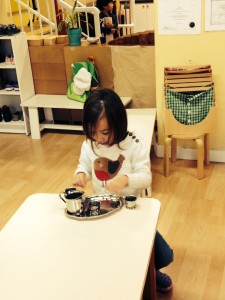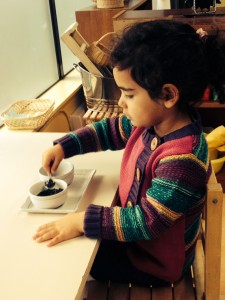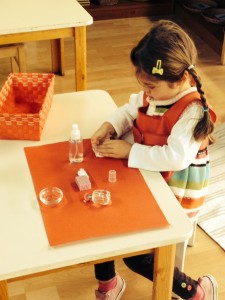Through Practical Life exercises of this sort, the children develop a true ‘social feeling,’ for they are working in the environment of the community in which they live. – Maria Montessori
Young children are naturally interested in activities they have witnessed in their lives and homes. The Montessori Practical Life exercises in our primary classrooms allow children to perform those real life tasks while enhancing the development of their organization and cognitive order.  Activities such as pouring, transferring grains and water, flower arranging, care of plants, polishing different types of materials, washing a table, mopping, washing cloths, buttoning, and preparing a snack allow children to engage in purposeful and meaningful tasks while developing muscular coordination and manual dexterity. By gaining control of their movements, children not only become more independent but gain greater ability to adapt and orient themselves to their classroom community and society. Grace and Courtesy lessons are presented as part of the Practical Life curriculum. These lessons present the child with elements of human conviviality and how we interact with each other in different social contexts. Formal control of movement exercises such as Walking on the Line provide the children with the opportunity to learn about their own bodies and movement while refining their gross coordination.
Activities such as pouring, transferring grains and water, flower arranging, care of plants, polishing different types of materials, washing a table, mopping, washing cloths, buttoning, and preparing a snack allow children to engage in purposeful and meaningful tasks while developing muscular coordination and manual dexterity. By gaining control of their movements, children not only become more independent but gain greater ability to adapt and orient themselves to their classroom community and society. Grace and Courtesy lessons are presented as part of the Practical Life curriculum. These lessons present the child with elements of human conviviality and how we interact with each other in different social contexts. Formal control of movement exercises such as Walking on the Line provide the children with the opportunity to learn about their own bodies and movement while refining their gross coordination.
Practical Life activities also provide direct and indirect preparations for Sensorial, Language and Math lessons. They include the development of work ethic, moving from left to right and top to bottom (pattern for writing and reading), the refinement of pincer grip and finger strength as well as the ability to follow a logical sequence of steps with order and precision.
 Children learn specific skills using Practical Life materials. Through engagement with these activities, children are provided with the opportunity to gain a greater sense of independence while developing their concentrative abilities. For example, a new student may start transferring lentils from one container to another by the use of a spoon. This focuses the child on a specific aim: move all the lentils by using a tool that is an extension to the hand. The physical act of holding a spoon and moving the lentils helps develops fine motor skills and grasp. The child learns to notice when a lentil spills or lentils are left in one bowl or the other, seeing what the desirable outcome is. The child will then strive to perfect his/her work because the procedure is self-correcting; that is, the child knows when the task has not been performed properly. This procedure builds concentration and sustained focus. By observing other children in the environment performing similar tasks, the child increases his/her observational skills. Successful completion of the task encourages independence and imbues the child a sense of pride and self-esteem. Eventually, after much practice, the child will master this method of transferring grains and will be ready for more complex activities, such as transferring water or pouring beans/water between two pitchers.
Children learn specific skills using Practical Life materials. Through engagement with these activities, children are provided with the opportunity to gain a greater sense of independence while developing their concentrative abilities. For example, a new student may start transferring lentils from one container to another by the use of a spoon. This focuses the child on a specific aim: move all the lentils by using a tool that is an extension to the hand. The physical act of holding a spoon and moving the lentils helps develops fine motor skills and grasp. The child learns to notice when a lentil spills or lentils are left in one bowl or the other, seeing what the desirable outcome is. The child will then strive to perfect his/her work because the procedure is self-correcting; that is, the child knows when the task has not been performed properly. This procedure builds concentration and sustained focus. By observing other children in the environment performing similar tasks, the child increases his/her observational skills. Successful completion of the task encourages independence and imbues the child a sense of pride and self-esteem. Eventually, after much practice, the child will master this method of transferring grains and will be ready for more complex activities, such as transferring water or pouring beans/water between two pitchers.

Throughout their primary years, children are presented with a progression of exercises with higher levels of complexity. These help to foster the development of greater fine motor skills and sustained focus. To an adult, these activities may appear quite simple; to the child, they are highly purposeful and an essential component in the Montessori classroom. During Parent Observation Week, take the time to notice children pouring, polishing, sweeping, spooning, washing hands, and transferring grains. Keep in mind that these meaningful activities not only prepare the children for practical living, but are vital to the development of their cognitive, emotional and physical abilities. The capacity for focused concentration, to perform independent actions and maintain self-control are qualities that serve children well in the Montessori classroom and beyond as they grow into confident, self-aware and well-adjusted individuals.
© Lions Gate Montessori
